Appalachian Scholars alumni reflect on OHIO journey, program’s impact
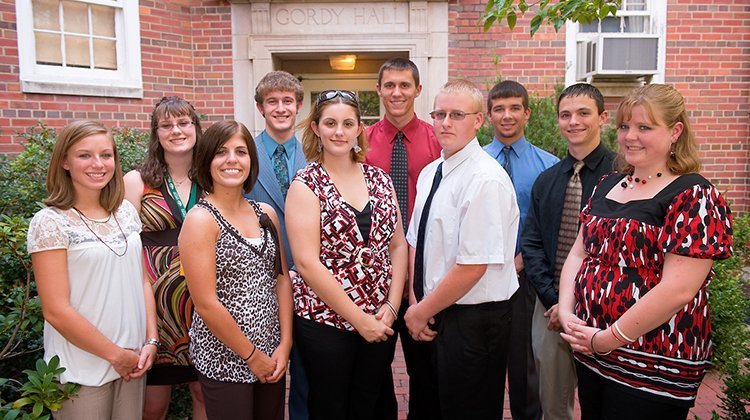
Pictured is the 2008 cohort of Ohio University’s Appalachian Scholars. Photo courtesy of Ohio University Communications and Marketing
Over the course of its 215-year history, Ohio University has embraced its unique position in and responsibility to the Southeastern Ohio region through initiatives focused on positive change for Appalachia. Those initiatives include providing opportunity to the young scholars who reside in Appalachian Ohio and are the future of the region.
In 2006, the University established the Appalachian Scholars Program, a merit and need-based scholarship awarded to high school graduates residing in Ohio’s 32 Appalachian counties. Students selected for the program are provided financial support, renewable for four years, and academic enrichment opportunities over the course of their college journey.
Many Appalachian Scholars are first-generation Bobcats paving the way for future students to access the same opportunities. Transitioning from typically small rural communities to OHIO’s Athens Campus can be both exciting and overwhelming, and the Appalachian Scholars Program seeks to ease this transition while also building a Bobcat community rooted in shared experiences.
Ohio Today news recently caught up with four Appalachian Scholars alumni who are making a difference in their respective communities.
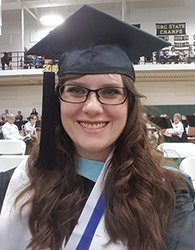
Appalachian Scholar Shea Daniels, BA ’12, MED ’16, is a Ross County native who studied creative writing as an undergraduate. She currently works as a counselor with at-risk youth in Pickaway County.
When did you first hear about the Appalachian Scholars Program, and how did it play a role in your college decision?
Shea Daniels, BA ’12, MED ’16: I heard about the program when I found a flier on the bulletin board in my high school near the guidance counselor’s office. I had applied to a number of schools in Ohio and was looking for scholarship funding. My family was always very pro-education. We had lots of books growing up, we watched National Geographic and we explored the world. I was blessed to have very inquisitive and intelligent parents who were very into education.
That being said, we could not afford college with six kids. One kid’s college may not be too expensive, but sending six kids to college is a whole lot of money. For me, the Appalachian Scholarship gave me access to a different caliber of experience that I would not have had somewhere else.
Matthew Friend, BS ’15, DO ’19: At the time I was participating in a pre-college program called Summer Scholars through Ohio University. This preparatoryprogram helped students prepare for college admission as they lived on campus and attended classes. In addition to this, they also advised financial aid options.
My adviser suggested that I apply for the Application Scholars Scholarship. I was quite intimidated at the time, but my adviser was fantastic and supported me through the process. It wasn’t until after I was awarded the scholarship that I learned that only one students would receive the scholarship. If I had known that beforehand, I don’t know if I would have applied.
Trace Lydick, BSME ’12: A cousin of mine, Jerry, was in the philosophy department for a while. Jerry was working for one of the offices here uptown and heard about the scholarship, so he called me up one day and told me to apply. I matched the qualifications that needed to be met, and I literally heard about it three days before the application was due.
I was actually on vacation when I found out. I remember sitting in the back of my car with an old laptop plugged into a power outlet typing these essays up. I faxed it in like an hour before it was due. The rest is history; I had an interview process and got a call after a baseball game and was offered the scholarship.
Brittany Miracle, BA ’12: I heard about the program because I was admitted to OHIO and they sent me a letter about how I was eligible for the Appalachian Scholars Program. So my family and I went down for an information session to learn more about it.
Getting the scholarship didn’t sway my decision to go to OHIO, but certainly, in retrospect, it did solidify the fact that I was able to finish. I am very sure I would not have made it the first full year at OHIO without the scholarship, both financially and just because of the support it provided. I probably would have ended up back home at a branch campus.
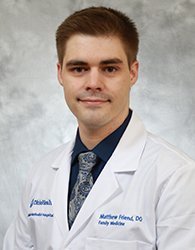
Appalachian Scholar Matthew Friend, BS ’15, DO ’19, is a Meigs County native who earned an undergraduate and doctoral degree from Ohio University. Dr. Friend is currently working in Columbus as a family medicine intern with OhioHealth Dublin Methodist Hospital.
What did you study at OHIO, and what inspired that decision?
Daniels: I came in as English major, in part because I really liked English and writing and partially because it gave me more scholarship money. I was interested in math and physics, but I went to a very small high school. In our high school, there were around 30 seniors and we were more or less in one room, so my college prep experience is very different from others in my county, let alone in wealthier areas.
In high school, I never had a geometry class. To this day, I’ve never had a biology class or chemistry class, so I didn’t necessarily come prepared with the background information to do those majors well – even though I enjoyed them, getting to the level I needed to be at was just totally overwhelming. That being said, I had never written a paper either, but I came in as English. I dabbled in a few other things but came back to creative writing.
I think it was because, being from Appalachia, storytelling is almost a holy tradition. Storytelling isn’t just the idea of making things up. It’s how we tell our history, how we narrate our experiences and how we form words that define our reality. This comes from a tradition of healing that’s as old as language itself.
So for me storytelling was a very natural thing. I am interested in economics, in health care and in education, of course, but to me storytelling encompasses all of that. Even as a counselor, I work with at-risk teenagers, and most of my kids are coming down from meth and heroin, and I’m working to get them stabilized. To me, storytelling is even a part of that because it’s the idea of how we narrate our traumas.
Friend: I studied microbiology. I always had a love of science and found microbiology to be fascinating and a great way to complete the classes requiredfor medical school. Afterwards, I applied and was accepted to Ohio University’s Heritage College of Osteopathic Medicine.
Lydick: When I got accepted to OU, I declared mechanical engineering and was accepted into the Russ College. I never changed.
I finished all on quarters. This was before the semester transition. I wouldn’t wish what I did on my worst enemy. I finished within the four-year time frame instead of five. I never took a summer class, and I interned at Honda twice, once in the fall and once in the summer. When I was interning in the fall, I couldn’t take classes, so I actually completed school in 11 quarters instead of 12, so really it was less than four years start to finish.
It was one of those battle scars you carry with you. The last couple years were tough, and my last six quarters were north of 20 credit hours, which, in a quarter, was a load — plus they were all core engineering classes.
Miracle: I studied social work and psychology. I picked that because I thought I wanted to be a child therapist, but my first two years were much harder than I expected. So I switched from psychology to social work because in social work you didn’t need a master’s degree to get a job, though I ended up getting a master’s degree anyways. But I liked social work more because it was more hands on and more visible in the community.
In my free time, I started an organization called Future Women of Appalachia. That went hand in hand with social work because we partnered with Chauncey Middle School to work with their kids involved in the child welfare system. It was a mentoring partnership of sorts. We did a lot of empowerment activities and one-on-one mentoring, and we also did snail mail pen pals, which helped develop writing skills and emotional learning.
I created this organization as a requirement for the Appalachian Scholars Program. We were tasked with creating a service learning program. Part of the lesson was we were supposed to fail, but that organization just never did, and it took off. I actually started it with Shea Daniels our first year.
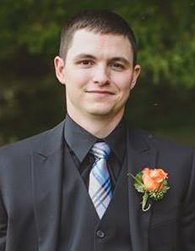
Appalachian Scholar Trace Lydick, BSME ’12, graduated from high school in Washington County and studied mechanical engineering in the Russ College of Engineering and Technology. He currently lives in Athens and works for Farrar Scientific in Marietta, Ohio.
In your time at OHIO, how did the Appalachian Scholars Program support you?
Daniels: The program offered what they called a pre-matriculation session. The year I was a freshman, they rented out a floor [in the new Adams Hall] and had all the incoming Urban, Templeton and Appalachian Scholars come for four or five days. We lived there, ate in the dining hall and got some experience of living on a college campus. For many of us, we were the first in our family to do this and the very first in our community experiencing this.
There was a variety of things we did that week. I remember a scavenger hunt and other activities to help get us grounded and used to the college experience. Once we got to campus, there were weekly roundtable discussions. I remember, at least my first two years, they were just Appalachian Scholars. Eventually it turned into all of the scholars involved in this program, so including Templeton and Urban. They were in the evenings and you dressed up, and they were a combination of life and career skills mixed with guest speakers who they felt might be beneficial to us based on our background.
Friend: The program offered a variety of mentoring services, bi-weekly professionalism workshops with the associated Templeton and Urban Scholars programs and a class all scholars attended on a weekly to bi-weekly basis. This class focused on a variety of topics, ranging from professional development to scholarly work and presentation.On a personal note, I met many of my closest friends through the program.
Lydick: There were regular check-ins to make sure we were doing all the things we needed to be doing. Academically, I kind of had things together, but we had other programs that really benefitted me. We did a trip to Washington, D.C., at one point in time and delivered a presentation at some type of Appalachian region meeting. We also had smaller research projects that helped our professional development, and you worked in teams with that. Those activities placed an emphasis on things like the importance of listening over talking and other team-building skills.
The nice thing was these resources felt available even after we graduated because you built personal relationships with people in the offices. I know there were some of us in the program who, years into our careers, would call up our old adviser if we had issues at work or just needed some advice. I know I’ve gotten ahold of Mark [my adviser] for things like patent development and other things I’ve been doing.
Miracle: First and foremost, the financial scholarship meant a lot. It means a lot to kids in Appalachia because we either would have taken out so many loans we couldn’t pay for or we would have gotten so far in our freshman year then dropped out because we realized we couldn’t afford it. They also offered us a book stipend, and books were not something I budgeted for because I was a first-generation college student and I didn’t know to think of that.
We had Ms. Pat [Bungard] and had a home base of sorts at the OSMAR (Office for Multicultural Student Access and Retention) office. We always had a place to go if we had questions, and they always helped us navigate the University. We also had roundtable discussions that helped teach us etiquette and how to set goals – things you don’t really get in a classroom. Roundtables are still something I think about as very formative. We also had weekly touch bases, and, quite honestly, at the time it felt like an overload of information. But now I’ll do stuff in my job and be like, “Oh my gosh! Mark [my adviser] taught me that!”
When I reflect on my experience as an Appalachian Scholar 10 years ago, they got it right. You have to address non-academic barriers to help these scholars succeed in the classroom.
I’ll never forget when I was in college algebra and I wasn’t doing well, and Mark told me to go to tutoring. I didn’t do it, and our next meeting he asked who my tutor was, and then he literally walked me to the library and got me a tutor. And that was exactly what I needed.
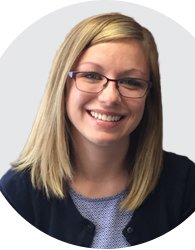
Appalachian Scholar Brittany Miracle, BA ’12, is originally from Guernsery County and studied social work at OHIO. As a student, she interned with Athens County Children Services. Miracle works in Columbus at the Ohio Department of Education as an administrator for child programming.
What work are you currently doing, and how do you feel this program helped you get there?
Daniels: I have two master’s degrees, school counseling and clinical health counseling. I do outpatient counseling with Integrated Services for Behavioral Health in Pickaway County, and my specialty is high-risk youth. For a while I did intensive outpatients with kiddos, which means I saw the same small group of clients three to five times a week, and they were extraordinarily high-risk youth that were deemed at risk of harming themselves or their community — to the point that they were at risk of being placed out of their homes permanently due to violence.
I love what I do. It’s my favorite thing in the world. I do traditional counseling with kiddos now, but I still focus almost exclusively on high-risk kiddos and teens with dual diagnoses. Most of my kids all have a substance abuse problem, commonly with meth and heroin, and most are between 13 and 17 years of age.
Friend: Currently I work as a family medicine intern at Dublin Methodist Hospital in Columbus, Ohio. I feel immenselyhonored to have finally achieved my goal of becoming a physician and wholeheartedly think that the Application Scholars Program greatly assisted in this endeavor. Whether by their mentorship or personal encouragement, they helped me to make the difficult transition to medical school and provided me with the skills necessaryto succeed.
Lydick: Because of the course load I took, I needed three weeks to decompress [after graduation]. The third week of July I felt ready to work, and the second interview I took was down in Gallipolis at a company called GKN. That’s the job I took and where I worked for five and a half years…
That first job out of college [at GKN Sinter Metals] was good. I learned a lot. I was given a lot of responsibilities, and I was able to propel forward. After three or four years, I started getting an itch – not to switch careers, just to find the next job.
This, I think, is a critical point. One of the things our adviser drilled into us that stuck with me was the old adage: “To whom much is given, much is expected.” When we started the [Appalachian Scholars] Program, it was never just a social program to help disadvantaged kids get a degree, get a job and be done. There’s a secondary component to that that says, “Now that I’ve been given an opportunity, I have to go forth and work hard to give someone else the same opportunity.” That’s something I’ve always held foremost in the things I’m trying to accomplish.
So I was at GKN, and I wasn’t getting that fulfillment of helping others. I mulled over this idea of starting something that could help the region, the environment and the people – something that you could use skills learned at the Russ College to do. I knew I needed a different skillset and a lesson I wasn’t getting at the plant. A buddy of mine worked at a company [Farrar Scientific] looking for a mechanical engineer. They do ultra-low temperature refrigeration and heat dynamics, stuff like that. So, I made the job change.
The last year and a half has been an education in terms of a business. I went from a billion-dollar, international company where I was delivering presentations to the CEO and had made a name for myself. I was doing good work. I had been to Europe several times on their dime. I could’ve done anything I wanted. I got all of that life experience, but it wasn’t getting me to my end goal.
This past year and a half has been difficult, but I’ve got a patent and I’m looking to start my own business over the next few years. I want to start a company, hire some good people, give back to disadvantaged people, and if things get big enough, I wanted to give back to this program that gave to me. That’s the long-term goal.
Miracle: I work at the Ohio Department of Education as a program administrator for our whole child programming. Basically, it’s just all of the non-academic support our students need, like addressing trauma, addressing nutrition and addressing their health. I also have led our rural initiative, which is something I’m proud of. When I started at the department, everything we did was centered around urban and suburban schools. There was never a lens on the Southeast Ohio region.
Several years ago, I called that to attention and developed a strategy to engage and improve our rural schools. What came out of that was a full-time employee, called the rural liaison, and he is in charge of connecting with Ohio’s Appalachian schools. When I was pitching this idea to my managers, I said it had to be culturally-sensitive, and they didn’t really get it. But I asserted that Appalachia is a culture and part of the reason we haven’t succeeded is because we haven’t recognized that we are different, and, of course, not in a bad way.
I knew that if we recognized Appalachia’s communal aspect, we would succeed. I did feel guilty about moving to Columbus and not moving back to my hometown, but I know we also need advocates in Columbus.
To learn more about the Appalachian Scholars Program and how you can support it, click here.
